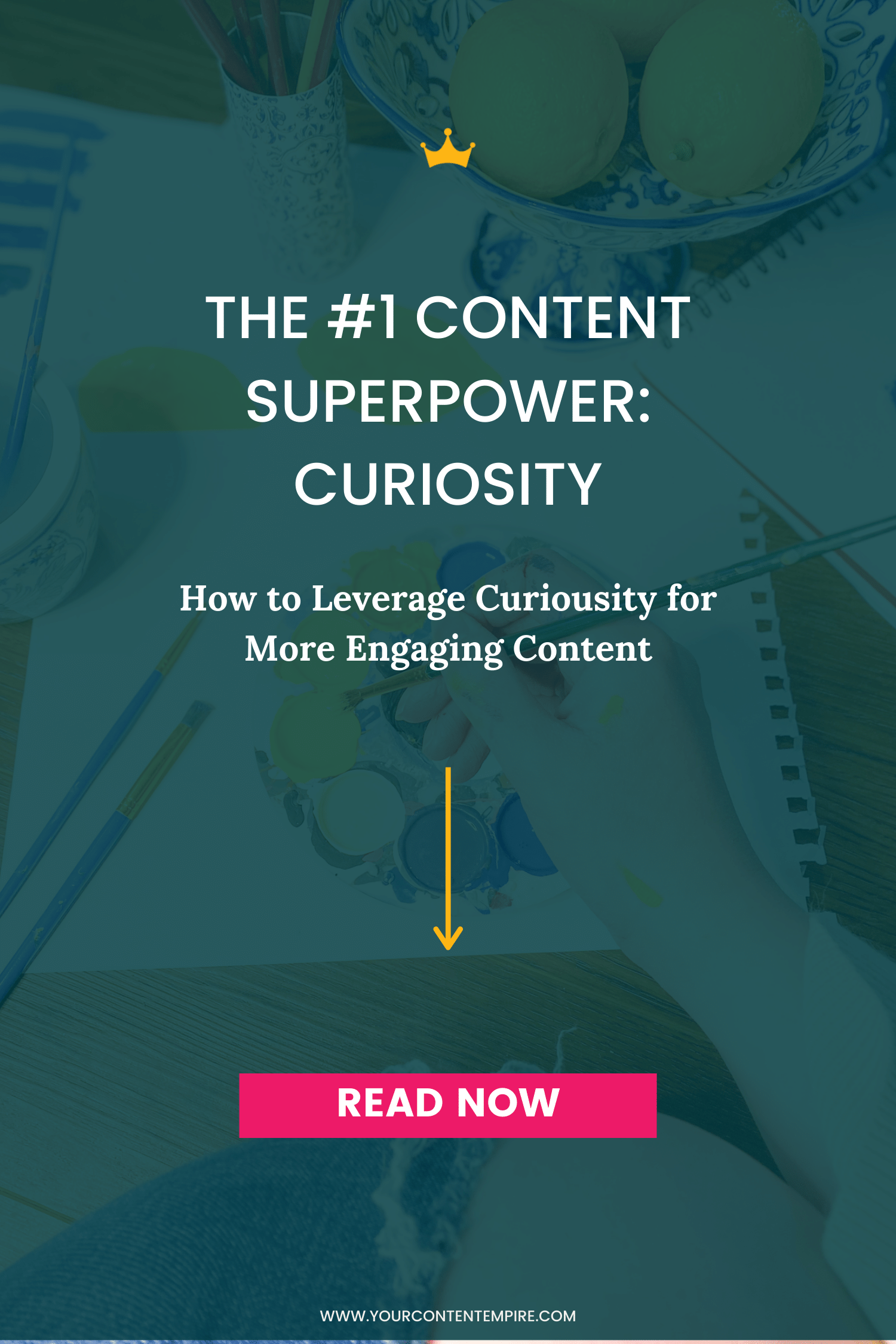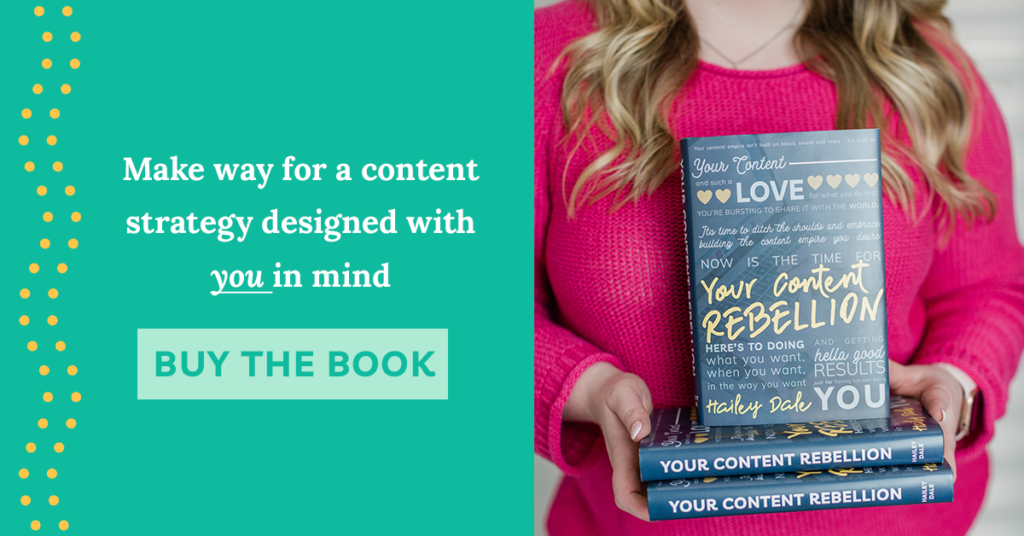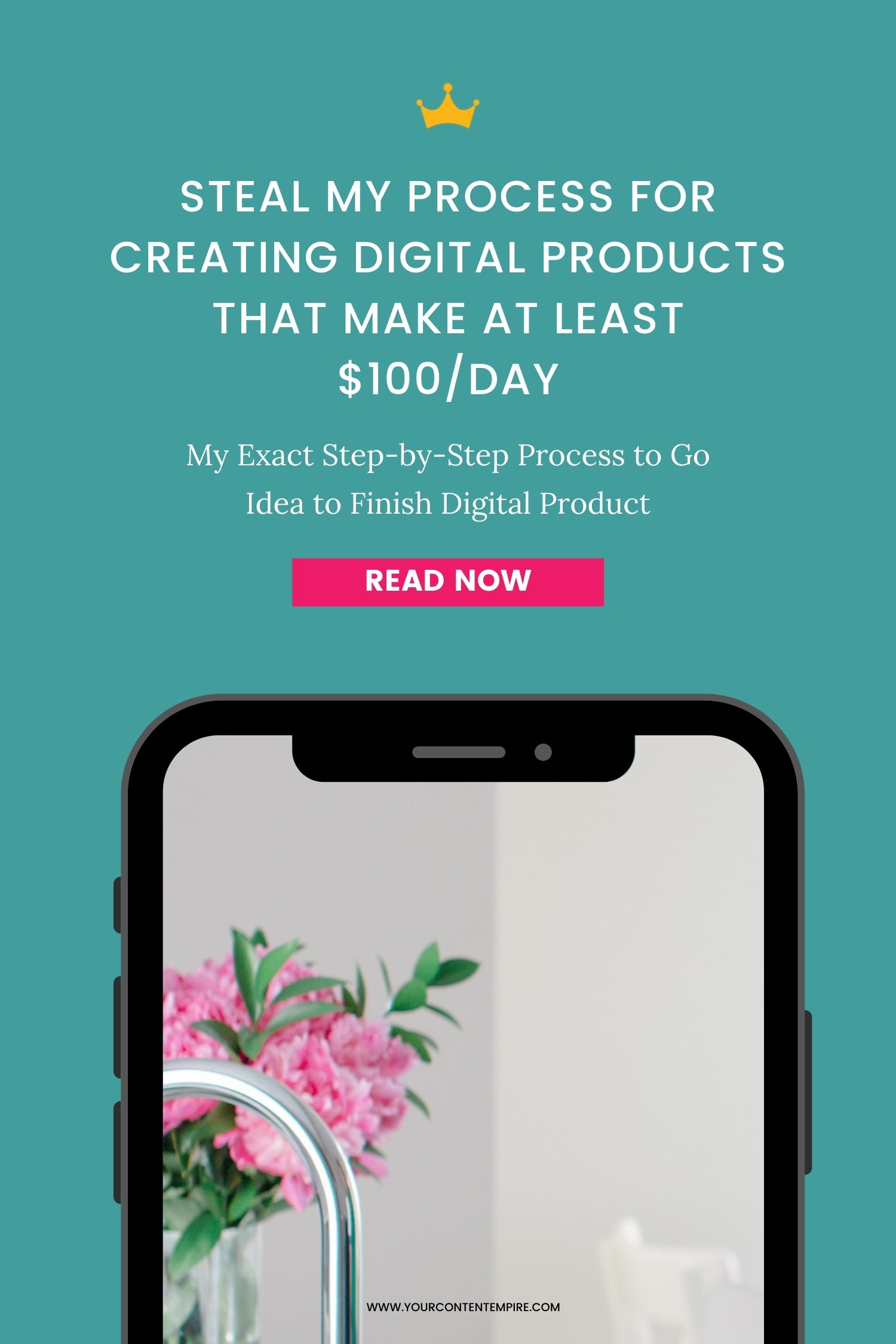Curiosity is your secret superpower for content marketing—whether you’re newer to your business or a veteran. We seem to have endless curiosity when it comes to learning more about our field. We have endless questions. Curiosity is often that spark we need to start creating and to get better at our craft.
New entrepreneurs are generally learning so much. They are registering for courses, signing up for freebies, watching a bunch of videos, and pinning things like crazy. But there is one roadblock that new entrepreneurs tend to encounter around content development. They think that because there’s so much they’re still curious about and still learning about in their field, that they are not the right ones to be sharing content.
Despite their endless curiosity, new entrepreneurs may experience imposter syndrome and fear being exposed as a newcomer. They shy away from developing and sharing content that teaches others because they are still in the learning process. In sum, new entrepreneurs have a lot of curiosity, but they're scared to use it for content creation.
On the other hand, we have veteran business owners. They’ve been building their businesses for a while now and they know what’s working. They’re making money, they’re working with people, and maybe they’re not creating content because they’re super busy delivering on their offers and services.
But, maybe they’re still going through these feast and famine cycles where they do a ton of marketing and get a ton of clients. Because they get so busy delivering on their clients’ offers, they stop marketing. Then the intense season passes, and they have to go back to marketing like crazy again.
As opposed to new entrepreneurs, veteran business owners might have less curiosity because they think they have learned so much already. They may wonder what else is there to know because they already feel like an expert in their craft. As a result, they can create content, but they might be lacking inspiration about their content topics (unless they’re really good at tapping into their audience’s curiosity).
For veteran entrepreneurs, finding their curiosity will be the spark that they need to really rev up their content marketing again. It will help them find topics that they’re excited about exploring and excited to learn more about.
All of our fields are constantly changing. Every day we discover new tools or better ways of doing things. We should never stop learning about our fields, even if we think that we have a pretty good handle on them.
Pairing content marketing with curiosity is a great way to stay on top of our trend, continue our skills development, and help us stay ahead of the curve as experts in our business.
Curiosity is both the spark and the secret weapon you need for all phases of content marketing—your planning phase, your content creation phase, and your promotion phase. I’m going to take you through each of the phases, pointing out how you can use curiosity to give your content that spark it needs to make it work for you. Let’s start with phase one—planning your content.
Phase 1 — Planning Your Content: How do I find my curiosity angle?
When it comes to finding your curiosity angle, the more that you are intaking information the better. (Just be sure to put a cap on it so that’s not all you’re doing.) Make sure that you’re reading, watching videos, staying in touch with those primary sources—the different tools you follow, the latest research in your field, all that’s new. Always be learning and exploring.
I know that things get really busy, but when we’re learning, we’re engaged. When we’re engaged, we’re more interested in our business and we show up more curious. Make sure to leave yourself time to nurture your curiosity because it’s our curiosity in this phase that gives us the energy to continue to build our business and our expertise.
I always like to leave my Sunday mornings open to review my Feedly and go through all the different articles I’ve been wanting to read. Before my husband is up, it’s my time to read and drink my coffee. It’s when I intake information and learn. I find it extremely helpful to create a routine around it so that I make sure I do it. I strongly encourage you to do the same.
Another helpful tip around leveraging your curiosity in content planning is to set up an inspiration folder. Whether you’re already on the internet working your online business or you’re away from your computer going about your day, having a notes folder will help you track and write down all the ideas as they come to you.
We all have hundreds of ideas every day, but if we don’t take time to write them down, there’s no chance we’re going to remember them. So, setting up some kind of inspiration tracking system—whether that’s a physical folder or a note in your phone’s app—to write down these ideas as you have them will be helpful. That way, when you’re out and about experiencing other businesses, especially those outside of your field, you’ll be subconsciously looking for inspiration and ideas to jot down.
You are now armed with two practical ways to leverage curiosity for the planning phase of your content development. Now we’re ready to tackle phase two—creating content.
Phase 2 — Creating Your Content: Why are questions the backbone of creating content?
An outline is absolutely essential when you’re creating any piece of content. You have to know where you’re going. People who overlook this step may be better at freestyling, or more likely, they’re staring at that blank page unsure of what they’re going to write.
I think that an outline is a really important part of the content creation process so that you take the piece where you want it to go, complete it, and ensure it fulfills your purpose for it. But I think the most important part of developing your outline—and a great way to really supercharge it—is to frame it in terms of questions. Instead of just saying “here's my main point and here are my three sub-points,” I think a more powerful way of creating an outline is to say “here is my main purpose of this post, here's my working title, and then here are three questions that this post is going to answer.”
When you can be responsive to specific questions—and only have to focus on answering those questions—versus simply freestyling it, you’re going to come up with better answers and better content. If you're somebody who struggles with content creation, say writing video scripts or marketing email content, when you can leverage and harness the power of questions, you're going to find it a lot easier to write that excellent piece of content.
This is why we use content interviews in our agency. For example, when we write outlines for our clients’ ongoing content strategies and blogs, we purposefully frame them in terms of questions. We’re then able to tell our clients to show up as if we were doing a podcast interview, and we simply ask them to answer the questions in conversation.
When we can take some of the pressure off our clients, then they don’t need to worry about writing all their content perfectly. As the ones creating the content for them, we’re making sure to put things in their own words. We are allowing them to be the experts because they’re the ones who have invested all this time in developing their process to be excellent.
For this reason, questions are the backbone of any piece of content. Adding questions into an outline will make your content that much easier to create. Now that we have your question-based content developed, we’re ready for phase three—promoting your content.
Phase 3 — Promoting Your Content: Why does curiosity matter when promoting your content?
When you’re promoting your content, you want to make sure that it’s something that people are going to want to click on. If we’re not promoting our content in a way that harnesses and leverages curiosity, people aren’t going to click through.
That said, part of phase three is to use teasers in your promotional copy to make people click through.
Here are some prompts:
- This is the ONE thing keeping you from….
- THIS is why you can never …
- Did you know this one thing is stopping your from…
When we use curiosity to get our readers thinking and clicking through, then we fulfill our goal of getting them over to the main piece of content.
Curious About Your Content Rebellion?
Remember, leveraging curiosity is simply spending intentional time exploring the things that most interest you. When you harness your curiosity you become more interested in your field and your relationship with your content marketing. Sharing that curiosity using questions and teasers gets people interested in and reading your content.
There’s so much more to learn about your own curiosity, your fields of interests, and curiosity as your content superpower, so definitely go and check out my book.
Leveraging curiosity for your content is something that I explore a lot more in my book Your Content Rebellion.







